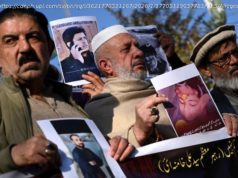It would give the airline industry more authority over who to charge for the services.
President Donald Trump announced his plan to privatize the air traffic controllers system, which would essentially hand over operations of the airways from the federal government to a nonprofit corporation. During an event Monday at the White House, Trump boasted that privatizing control of the nation’s skyways will speed up modernization of the air traffic system, which has been slow to switch from radar to more precise — and efficient — GPS technology. “It’s a broken, antiquated, horrible system, ” Trump said Monday to a group of airline executives. The nation’s largest air carriers have been lobbying for such a change for years, but Republicans in Congress have failed to get enough support to pass a bill. Democrats have been resistant in handing over control of the airways to big businesses. Trump’s interest gives renewed momentum to the idea. His plan is on a bill introduced last year by Rep. Bill Shuster, a Republican from Pennsylvania. Trump says the plan would save taxpayers from funding air traffic operations and would be paid with “no tax money” at all. But the structure of the nonprofit corporation would give board members (mostly airline industry representatives and workers) , broad leeway in raising prices on consumers to cover the cost of air traffic services. According to the Congressional Budget Office, such a plan (based on an analysis of Shuster’s bill) would actually increase spending on air traffic services to speed up modernization efforts. It’s very likely that under Trump’s plan, consumers will continue footing most of the bill for these operations, which will now be more expensive. “Sooner or later air passengers will bear the burden of this expensive new entity in the form of more expensive air fare, ” wrote Andrew Langer, the president of the Institute for Liberty, a small libertarian think tank, in The Hill newspaper. The Federal Aviation Administration currently employs about 14,000 highly trained air traffic controllers who monitor and direct airline traffic across the United States, making sure that one plane doesn’ t crash into another. Right now, consumers pay most of the cost through a 7.5 percent excise tax on airline tickets. That money goes to the federal Airport and Airway Trust Fund, which pays the salaries of air traffic controllers and their operations as part of the Federal Aviation Administration. At the beginning of fiscal year 2017, that trust fund had $14.7 billion dollars. Under Trump’s plan, the FAA would no longer control air traffic, and would no longer tax travelers to pay for this service. Instead, it would hand over the system to a nonprofit corporation. Yet the new company is not exactly a private corporation. According to the Congressional Budget Office, which analyzed Shuster’s bill, it would be a quasi-governmental agency, kind of like Fannie Mae or Amtrak. “It would effectively act as an agent of the federal government in carrying out a regulatory function, ” Theresa Gullo, a budget analyst. Under Shuster’s bill, oversight of the air traffic systems would be given to a 13-member board, made up mostly of commercial airline representatives and workers. They would then raise money to pay for air traffic control services by charging user fees and selling corporate bonds to investors. The corporation would charge airlines and other companies the fee, which they could easily pass on to consumers by raising the cost of airline tickets. Budget analysts believe that privatizing the system would actually cost more money. Shuster’s bill, which inspired Trump’s plan, would raise mandatory spending by $89 billion and increase the deficit by $19.8 billion over the next 10 years, according to a Congressional Budget Office. This is largely from the added cost of the needed equipment and technology to speed up the modernization process. Republicans have been pushing for this change because the airline industry has long complained that the United States lags other countries in providing fast and precise air traffic information. The Federal Aviation Administration has been in the process of updating the system with the latest-cutting edge technology —a program known as NextGen— for years. But a government audit released last year blasted the agency for a number of unnecessary delays and inefficiencies in getting it done. Democrats have resisted handing off air traffic control services, saying that airline interests would end up dominating all decisions. And labor unions that represent air traffic controllers have been hesitant about privatization, out of concern that employee pensions and benefits would be curtailed in the private sector. Shuster’s last bill, which failed to get enough support in the Senate, provided salary and benefits protection for all federal employees transferred to the private corporation, though it did not guarantee the same benefits to new hires. The National Air Traffic Controllers Association, which represents 20,000 workers, has since started to warm up to the idea of privatizations. Paul Rinaldi, the association’s president, says that a private company might be able to modernize the system and provide a more “stable, predictable” funding stream. “We look forward to reviewing the specifics of the air traffic control (ATC) reform legislation so we can evaluate whether it satisfies our union’s principles, including protecting the rights and benefits of the ATC workforce, ” he wrote in a statement Monday.






